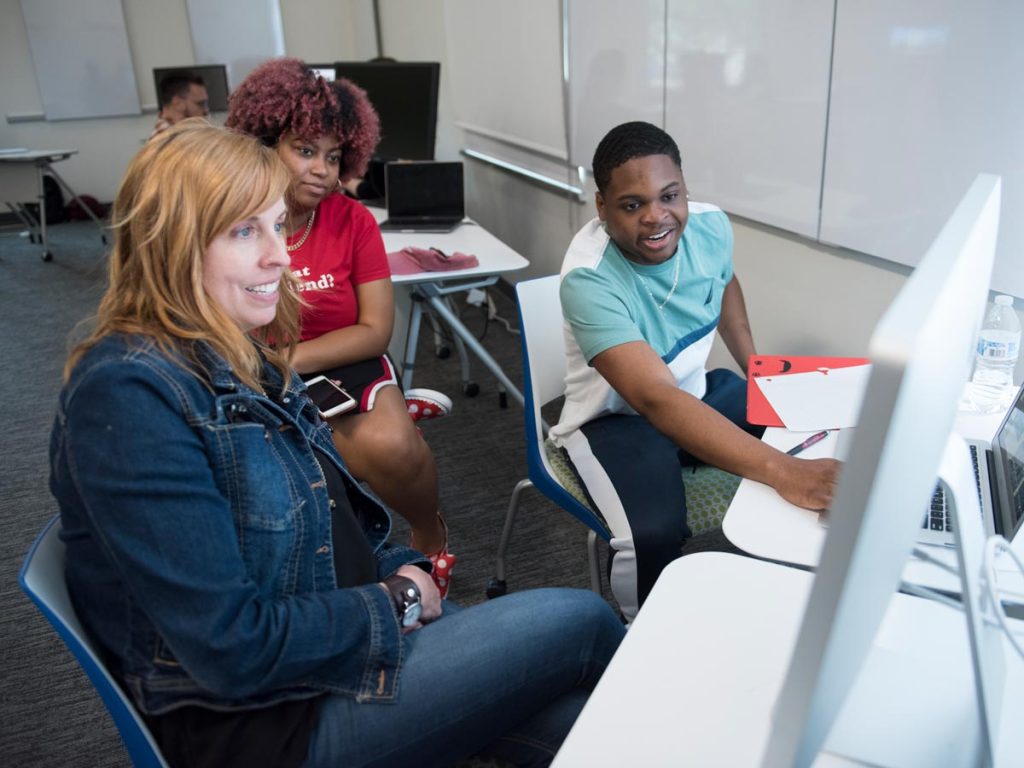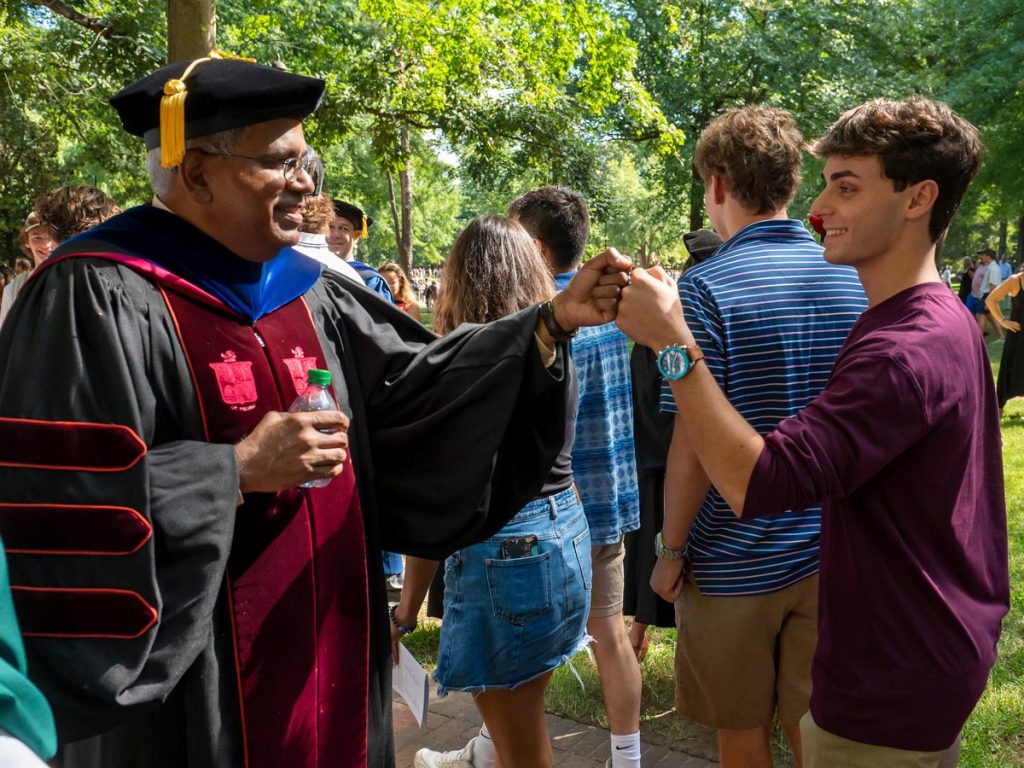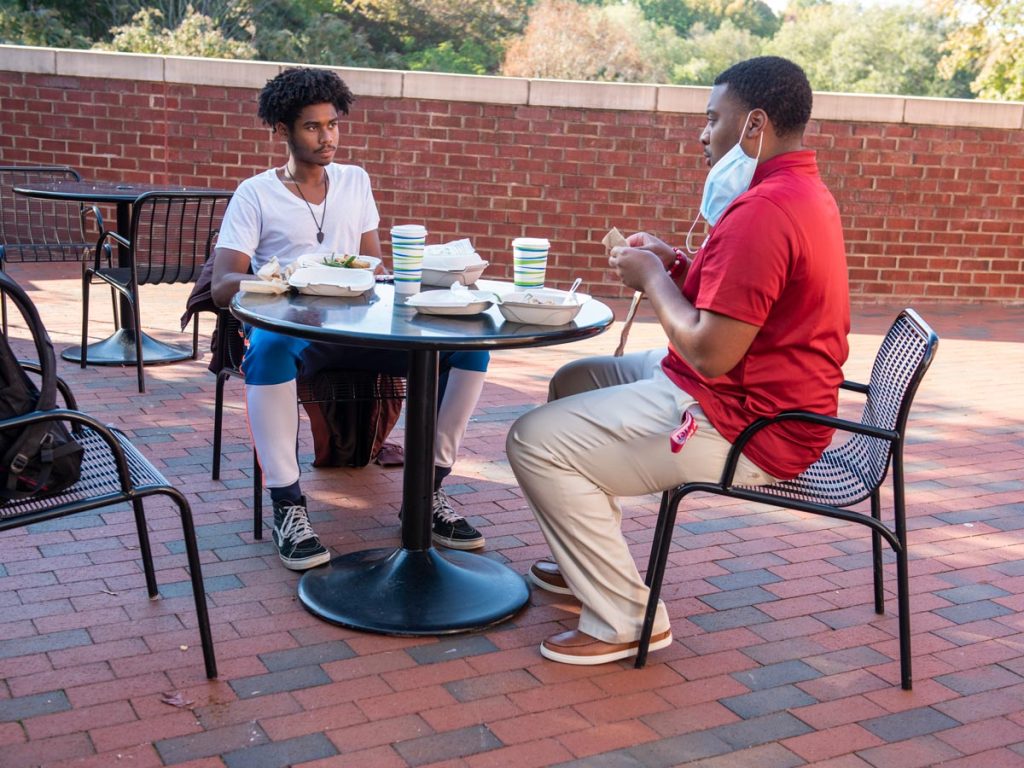In the fall of 2023, the Mentoring Design Team implemented several pilot programs based on the meaningful relationships framework the group developed in the 2022-23 academic year. As of April 2024, these pilots include:
Revisiting Undergraduate Academic Advising: The Use of Peer Advising Support
A peer advising model embraces the positive scaffolding third- and fourth-year students can offer to first- and second-year students in the same major. The peer advisor supports new majors by providing academic advice, identifying resources, and reinforcing the work of the faculty advisor. This pilot program is designed to support the faculty and students in majors with the largest advising rosters. Since the launch of this pilot, advising mentors have been hired in psychology, public health studies and the Love School of Business, with plans to expand to the School of Communications, the Dr. Jo Watts Williams School of Education and general student advising mentors to support exploratory students.
 Developing Opportunities and Skills to Support Mentoring in Meaningful Relationships for Graduate Students
Developing Opportunities and Skills to Support Mentoring in Meaningful Relationships for Graduate Students
The current pilot focuses on developing an awareness of how to recognize meaningful relationships and skills for network building as an Elon graduate student. It prioritizes well-being and belonging; creates onramps and equitable access to meaningful relationships by establishing a common framework, language, and specific skills; and establishes the importance of seeking out and prioritizing meaningful relationships at the start of the graduate student experience. Since the launch of this pilot, workshops focused on wellness, mentoring and intentional networking were developed and delivered to new graduate students in the Love School of Business, the School of Law, and the Dr. Jo Watts Williams School of Education.
First-Year Mentoring in Meaningful Relationships Learning Outcomes
A small workgroup with representatives from Elon 1010, the Core Curriculum, New Student Programs, Admissions, Residence Life, and Academic-Residential Partnerships have begun mapping potential learning outcomes to incorporate into the First-Year Experience signature programs, benchmark peer/aspirant schools, and ensure intentional and scaffolded opportunities for first-year students to learn about and find pathways to meaningful relationships.
 The Phoenix Mentors
The Phoenix Mentors
This peer mentor program is designed to support incoming students during their crucial first year of college. The program aims to foster a sense of belonging, provide academic guidance, promote personal development, and assist students in navigating the challenges and opportunities that come with their transition to college life. Seventeen mentors were selected and trained to provide peer mentorship and coaching for two to three mentees each, with whom they meet bi-weekly. Mentors complete an assessment after each meeting where they can share how they believe their mentees are adapting, as well as any concerns and struggles.
Peer Relationships: Expanding the Peer Mentor Model
How or why do students come to see themselves as a mentor or someone who is responsible for and capable of cultivating meaningful relationships with their peers? Through two communities of practices (COPs), this question will be explored in pilots designed to enhance the leadership development journey for Elon students. Additionally, these COPs have gathered tools, best practices, thoughts, and ideas about peer-to-peer mentoring at Elon. One COP is made up of faculty and staff and the other is made up of students and Mentoring Design Team committee leaders. Both COPs have met numerous times thus far and have begun to develop key findings and insights and goals/needs moving forward.
 Meaningful Relationships as an Equity-Driving Support System for Historically Underrepresented Minority Students
Meaningful Relationships as an Equity-Driving Support System for Historically Underrepresented Minority Students
To effectively support historically and presently underrepresented minority students, faculty and staff, we must center equity and inclusion in and throughout all forms of meaningful relationships. The current pilot is focused on enhancing and deepening the nearly 30-year-old SMART Mentor program for both mentors and mentees. Since its launch, mentors took the Intercultural Development Inventory Assessment, received their individual report, participated in a group debrief, and developed learning plans to help determine how increased cultural agility can positively impact peer-to-peer mentoring. Mentors meet regularly with their “head of family” student coordinator to discuss their mentees, their overall experience, and their respective learning plans. The pilot also aims to enhance the mentee experience by adding faculty and staff to the existing mentoring family structure (student coordinator-mentor-mentee).
Handbook for Elevating the Advising Relationship (HEAR) Pilot
The relationship between students and their academic advisors is central to the student experience, and is a relationship ripe for deepening and direction. In this pilot, we are developing a Handbook for Elevating the Advising Relationship (HEAR) that is meant to support faculty in their academic advising work. Our group has worked to pull together into one place relevant resources for advisors, as well as create guiding questions and prompts that advisors can use before, during and after their advising meetings. For example, we created a pre-advising-meeting survey for advisees to complete prior to their advising appointments such that advisors have more information available to them to target and deepen their advising meeting. We have intentionally focused on the sophomore and junior years, an important time period that has often received relatively less attention than the first-year and senior-year bookends. In spring 2024, 36 faculty from a variety of departments have participated in an initial pilot that involved using resources that are meant to eventually become part of the handbook.
Bolstering Your Mentoring Skillset Professional Development Pilot for Faculty & Staff
This pilot is uniquely designed to help staff and faculty develop skills in each of the four competency areas our team of expert leaders identified as foundational to mentoring in meaningful relationships. They are:
- Cultivating empowered relationships with others
- Supporting growth and learning
- Developing your critical consciousness
- Enhancing your own interpersonal skills
Participation in this pilot will happen over four steps:
- Step one is completing the pre-assessment, which is designed to help participants tailor their professional development by identifying specific skills they may want to focus on to maximize the potential of the learning pathway.
- Step two is completing the learning pathway, which is embedded within the LinkedIn Learning platform. Participants will complete one entire course under each competency using their self-assessment to guide course selection.
- Step three is engaging in two communities of practice over the course of late spring and early summer. While the pathways are asynchronous, we want to cultivate a community of practice designed to provide staff and faculty a space to share and reflect upon their experiences with others.
- Step four is a post assessment designed to highlight their growth and learning after completing this pilot. It will also be an opportunity for them to share feedback with the Mentoring Design Team as we work to provide recommendations to enhance professional development opportunities for staff and faculty to bolster their mentoring skillset.

